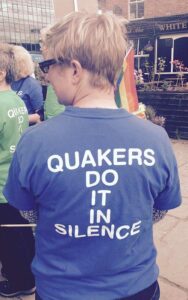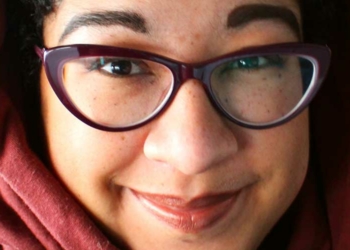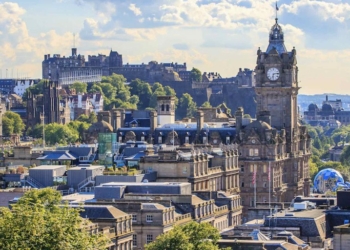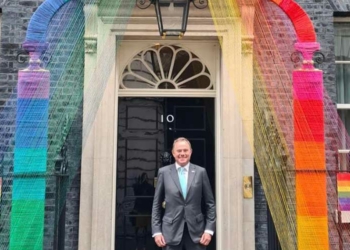The Society of Friends, also called Quakers, are a radical religious group that did away with church tradition, believing in ‘that of god in everyone’, and encouraging people to live their faith every day through their actions. Numbering only 17,000 in the UK, Quakers have always punched well above their weight in terms of social justice: they are known for their stance on prisoners’ rights, slavery, conscientious objection, mediating in conflict – and same-sex marriage.
Because of their cautious ‘discernment’ process, the Society took a long while to get to the point, in 2009, of throwing their weight behind the battle for same-sex marriage. Despite the publication of the groundbreaking and enlightened Toward a Quaker View of Sex in 1963, the process was, to many gay and lesbian Quakers, frustratingly incremental. Nowadays, they are seen as a force for good by many LGB people: I’ve marched with them at Manchester Pride, and the Quakers always get a supportive cheer from the crowd.
I have been involved for a decade, and because of their stance on same sex marriage, I knew I would be welcome as a lesbian. I had experienced a rough ride as a young person in an evangelical Christian church that deemed me sick and a sinner, but after years of rejecting all religiosity I was deeply drawn to the quiet, unassuming spirituality of the Society of Friends. Its consoling and humble advice to ‘think it possible that you may be mistaken’ (Advices and Queries 17) reassured me I would be part of a spiritual community of seekers who would not indulge in diktat or dogma.
It is perhaps because of the good press they have received for their approach to same-sex marriage that Quakers have seemed open to embracing the transgender trend now sweeping through our culture. Prominent young Friends have enthusiastically embraced the new social justice cause that is trans rights (with those not following the script quietly leaving or, ironically, being made to feel unwelcome.) Quakers are an aging group, and it’s fair to say that the organisation wants to keep hold of its younger members. As for the older generation, they may well be assuming that this is like ‘the gay marriage thing’, and are perhaps content to rubber-stamp it through, having not seen or heard anything that would caution otherwise.
Attempts by gender critical Quakers to draw attention to the provision of training by the controversial group Mermaids, or to ask questions about safeguarding practices that allow Quaker teens on residentials to sleep overnight in the dorms of their choosing have been brushed off impatiently or met with silence.
The reason for this lack of balance is because there has been corporate capture and uncritical acceptance at the London HQ: the so-called Tabular Statement (a record of Quaker members and meetings) has asked the question, since 2015, whether Friends are “male, female, or other”. Attempts by gender critical Quakers to draw attention to the provision of training by the controversial group Mermaids, or to ask questions about safeguarding practices that allow Quaker teens on residentials to sleep overnight in the dorms of their choosing (despite telling parents and caregivers that the dorms will be separate for boys and girls) have been brushed off impatiently or met with silence.
My decision to address the trans question in Quakers was sparked after a statement by Young Friends General Meeting after a Woman’s Place UK meeting took place in a Quaker meeting house. Aside from asserting that there was “no conflict” around the issue of trans rights, it stated:
“Last year several Quaker meetings hosted events by ‘gender critical’ groups, who use the position that gender is solely a social construct to argue for the exclusion of trans people, particularly women, all too often through fear and misinformation.” (https://yfgm.quaker.org.uk/trans-non-binary-statement/)
After that, I felt I needed to alert the Quakers closest to me about the issue in the hope that both sides could be heard. This sparked a journey that has been time-consuming and distressing at times, despite being upheld by Friends closest to me, and by gender critical Quakers across the UK.
Quaker processes have antiquated names, but they often produce good results because they insist on careful listening and thoughtful consideration of different perspectives. After several talks given locally and further afield, I pressed ahead with asking my meeting to support the issue as what we call a ‘Concern’ – a deeply held conviction that compels one to act. The process of deciding whether mine was genuine was rigorous, but it was accepted by my local meeting, and they have been supporting me stoically ever since.
Once the Concern was adopted by my local meeting, we turned to our Area Meeting (the next tier in the organisation) to see whether they would respond. It was decided that the Area Meeting Clerks would hold what is called a ‘threshing meeting’. The clue is in the name: it is a process by which a difficult topic can be subjected to scrutiny, examined from a number of perspectives, and hopefully a way forward can be discerned – although there is no pressure to reach a conclusion.
Undoubtedly, there was a genuine desire to achieve something rare: an online gathering of Quakers who were trans, non-binary and their allies, alongside gender critical lesbian feminists like me – and everyone in between. Certainly, the fact that three of these meetings happened is in itself extraordinary.
Pity the clerks and supporting Friends tasked with putting this together within the toxic environment around trans and women’s rights. Undoubtedly, there was a genuine desire to achieve something rare: an online gathering of Quakers who were trans, non-binary and their allies, alongside gender critical lesbian feminists like me – and everyone in between. Certainly, the fact that three of these meetings happened is in itself extraordinary. Quaker discipline meant that few angry or aggressive words were used, and that all involved listened to the speakers – or appeared to.
Did it work? Is my Area Meeting now a beacon of conciliation and unity around gender identity? Far from it, I’m afraid. By the third online session, I was beginning to have doubts about how even-handed the process was. The gender critical view was positioned as a ‘perspective’ made up of ‘possible fears’, and we were not able to circulate reading material ahead of the session. Where the trans and non-binary people had a Q&A slot in the second meeting, we were not afforded the same opportunity. Were the organisers of the meetings under any pressure to prevent gender ideology being critiqued? It seems unlikely. But noises from Quaker central are strongly and unquestioningly trans-affirmative, and perhaps the desire to toe the party line is strong.
As I had feared, all but one of the trans and non-binary young people who had previously attended had dropped out, citing their mental health. Gender identity is not a concept that can be critiqued without seemingly doing damage to people with fragile identities. Additionally, an insistence on all speakers talking from experience meant that while outpourings of emotion were welcome, logical explorations of the flaws of gender identity were not. Feelings trumped logic; being kind was used as a way of shutting down those of us with legitimate concerns.
A favourite Quaker saying is “what does love require of us?” My answer is: the truth. Coming out as trans is not the same as coming out as gay or lesbian.
While Quakers have, historically, never shied away from speaking truth to power, there is a subtle abandonment of truth taking place in the Society of Friends. At the annual gathering of Quakers this year, the issue of gender was explicitly addressed. It was presented to the Society as ‘Acknowledging and Welcoming Gender Diverse People’. In a neat bit of straw manning, Quakers were asked to welcome and show support for trans and non-binary Friends, when of course they were already welcome. The framing of the matter was such that gender identity theory was never up for discussion, and the many ways in which it is harmful were glossed over. Indeed, what the Society has done this summer, under the guise of simple kindness, is welcome gender identity theory as unexamined fact, paving the way for the purity spiral that inevitably follows.
A favourite Quaker saying is “what does love require of us?” My answer is: the truth. Coming out as trans is not the same as coming out as gay or lesbian. The latter seek to embrace an honest commitment to the reality of their sexed bodies and desires; the former seek to deny their embodied reality in a narrative of self-deception. While the reasons for this can arouse deep compassion and even understanding (I was ‘gender dysphoric’ as a teenager), the problem arises when demands are made on others to go along with the deception, by changing their language or spaces for example.
By not examining gender identity, the safeguarding of young people is flawed; Friends are not properly discussing the tension between being kind and being honest; the discernment process – usually a strength in our movement – has been circumvented on this issue; women and homosexual rights are being sidelined; and the impression of progressive young people versus ignorant, fearful dinosaurs is being reinforced. We are Quakers: we must do better than this.

Deborah Evans is a Quaker and gender critical lesbian feminist who works in education, and is currently learning how to be a parent.
Top photo: Robert Evans/Alamy Stock Photo
























Trans-substantiation is a great title in how it refers to the C16 theological rift between Protestants and Catholics. While Catholics held that the Communion bread and wine were literally the body and blood of Christ, Protestants took a more metaphorical view. The parallel today is that gender ideology extremists maintain that transwomen are literally women, but others who support trans rights with or without being gender critical, say they are not so. Rather, trans identity is a legal fiction that enables and facilitates people with genuine gender dysphoria to 'live their best lives' as JK Rowling famously tweeted in 2019.
I believe that some people have a gender identity that does not match their biological sex. Such people are Transgender. I believe in the right of Transgender people to express their gender identity at any age. What I do not support is bans against saying Trans people are Trans! If Transpersons choose to pass themselves off as biologically male or female, it's not for me to assist them doing that. I firmly oppose puberty blockers for children, as well as any hormonal or surgical procedure that leads to sterilization. "Confirming" gender by surgically removing genitalia and reproductive organs is barbaric and genocidal. It amounts to physicians playing God, and it has frightening implications for us all.